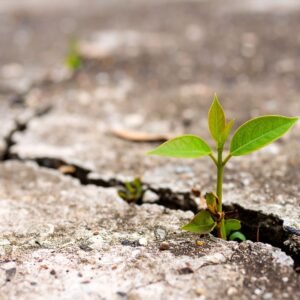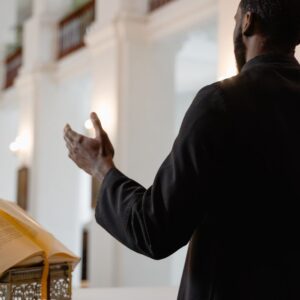This article is an excerpt from an interactive discussion with Organizational Psychologist and Executive Coach Dana Scannell, PhD and Dr. Rose Madrid Swetman, of the Center for Transforming Engagement. Dana and Rose share the challenges they hear as they do consulting work with teams, clergy, nonprofit leaders, and people that used to be leaders and are now deconstructing their faith.
In the demanding world of leadership, burnout isn’t just a possibility—it’s a real and present danger.
For pastors, nonprofit leaders, and anyone in a caregiving role, the weight of responsibility often overshadows the need for personal well-being. In this candid conversation, Rose shares her powerful testimony of experiencing heart failure due to leadership stress, while Dana offers compelling insights into the physiological and emotional toll of distress, and the urgent need for sustainable self-care.
The dialogue dives deep into the differences between eustress (the motivating kind of stress) and distress (the harmful kind), and how unchecked stress can manifest in serious health consequences.
From establishing a true Sabbath to connecting with “balcony people”—those who cheer us on and support us unconditionally—this discussion emphasizes that self-care is not a luxury, but a leadership essential.
Whether it’s journaling, positive self-talk, or managing your internal pressure cooker, leaders must develop intentional rhythms of rest, community, and purpose to thrive long-term.
Who are your people? Who are you gonna call? Who will pick up the phone if you’re in crisis at two in the morning? Who are your people in different categories? What are the practices? Whether it’s a spiritual discipline or I need to drink one more glass of water a day for my own wellbeing. And then of course, we have this innate wanting to make the world a better place, to recreate the world after whatever happened in Genesis three.
These are the streams of resilience that we talk about in our resilience circles. Learn more about our resilience training for leaders.
Full Transcript:
ROSE I want you to take a few minutes and really talk about the self care for leaders. I had heart failure as a leader nine years ago through stress in my pastorate. And that was caused because I wasn’t taking care of myself. This is so important because we’re an integrated being – body, mind and spirit. So all that stress, the things that leaders hold, often will make them sick if they aren’t processing and doing self care well. So Dana speak to that.
DANA You’re absolutely right, Rose. One of my parts of my dissertation was looking at the difference between eustress and distress in performance. So eustress is the positive. It’s the thing that allows somebody to come across a car accident and pick up a car, right. Something they never could do. And distress is obviously the thing that takes them out. We live in a world of distress. We live in a world of conflict. We can walk right into any one of our homes, our businesses, our workplaces, our churches and our organizations and see conflict constantly. And it weighs.
So part of this is remembering that idea of the notion of positive behavior. Behavior that gets praised, that gets repeated, right? What am I telling myself? “You’re a failure, you have to do this all by yourself.”
What’s the self-talk? What if I wake up? What’s my meditation? What am I telling myself?
Remember that praise or positive, triggers that dopamine release in our bodies, which is the feel good chemical in our brains that helps us cover. I think so many of us don’t tap into that, and what we run around with is all this negative stress and all of the hormones that get released along those lines. And if we start to measure those cortisol levels, we’re gonna start to see things that we don’t wanna see and that’s building up and never gets released. So self-care, Sabbath.
ROSE I can tell you when those hormones build up to a place, they turn to plaque in your system, you will either have a stroke or a heart attack. And mine was my heart. So yeah, it’s not good.
DANA So how do we prevent those? We’re gonna prevent those discovering how to take time. The good Lord made the world and then he rested. It says it, so that’s a good place to start. Like I need a Sabbath. It doesn’t have to be Sunday. If I’m in the ministry and Sunday’s my Super Bowl day, well then that’s not a best day. But I need a day, and I have to protect that day. And I have to do things that fill my tank. I also have to get exercise, and start looking at my diet, and I start going, you know, that’s not gonna go so well. So I exercise and diet, those things that we all know.
How does self care for leaders work? It works differently for different people. It’s time, it’s time alone, it’s time maybe with one person, it’s conversation, it’s having that person I call your balcony people. Who is cheering you on that you need to plug into on a periodic basis? Who is your 2 a.m., 3 a.m. list that could be those people? It doesn’t have to be that I have to call them at 2 or 3 a.m., but who would wake up if I needed to call them? I know I could call them at 2 or 3 a.m. and they would wake up and go, oh my gosh, what’s going on? How can I be with you?
We need to have people in our lives that are our relief valve. My mom growing up had a pressure cooker, you know, and it would make all this noise. And it always scared the daylights out of me. It was like a volcano about to blow, so I just kind of steered clear of it. But I take that metaphor. What’s your pressure cooker look like? And where’s the steam release valve that is getting created on a regular basis? Whatever that looks like – music, time alone, journaling. I am a big proponent of journaling. I don’t care if you write sentences. I don’t care if you write disparate thoughts. I don’t care. Get it out. I’m sure there’s lots of other ideas but I just love the idea of what do I need to do to be proactive about taking care of myself? Because if I don’t, I’m going to end up in somebody’s emergency room or doctor’s office with heart attack, stroke, cancer.
ROSE One of the things at the Center for Transforming Engagement that we have found in our research for wellbeing, specifically, primarily for clergy, but it really does stream out to others, that the three streams of resilience, people, practices, and purpose. And you just said is.
Who are your people? Who are you gonna call? Who will pick up the phone if you’re in crisis at two in the morning? Who are your people in different categories? What are the practices? Whether it’s a spiritual discipline or I need to drink one more glass of water a day for my own wellbeing. And then of course, we have this innate wanting to make the world a better place, to recreate the world after whatever happened in Genesis three.
These are the streams of resilience that we talk about in our resilience circles. Learn more about our resilience training for leaders.










0 Comments